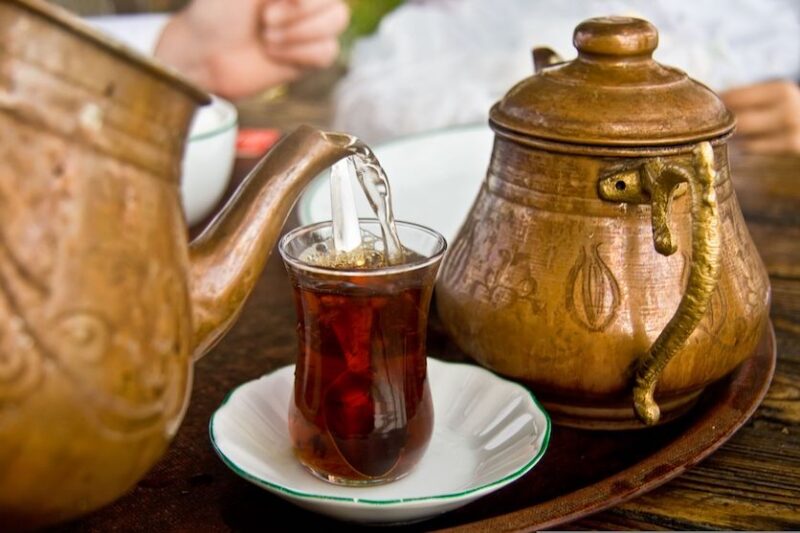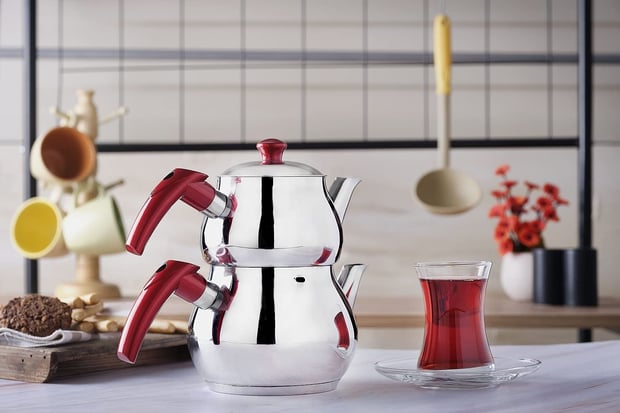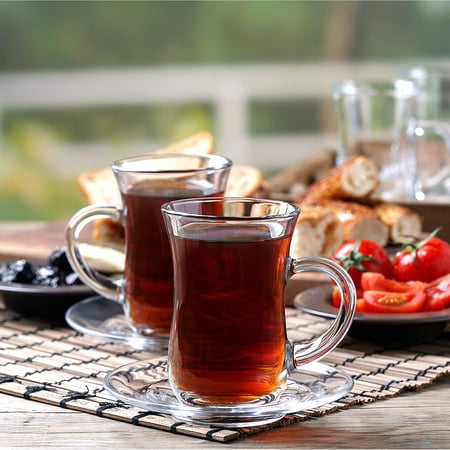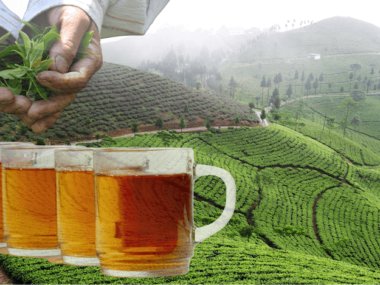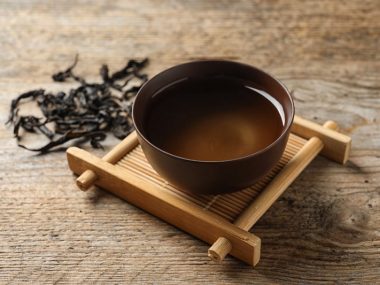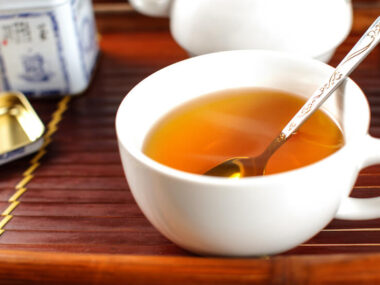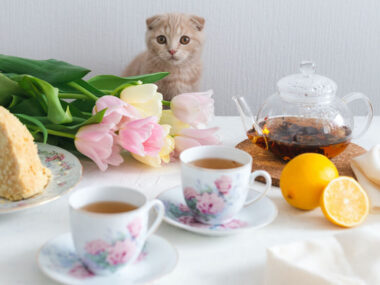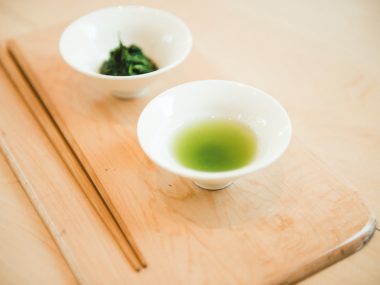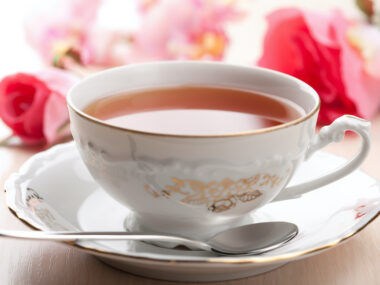Who knew that a 4.25 oz. serving of concentrated tea had the power to build bridges between people. Turkish tea, a hookah, and interesting conversation bind people of all walks of life together. This combination is way better than a juicy soap opera and a box of bonbons!
Disclosure: We may earn commissions for purchases made through links in this post.
Table of Contents
What is Turkish Tea?
Turkish tea is a black tea beverage deeply rooted in the culture of Turkey. The tea plant (Camellia sinensis) is grown in the Rize province of Turkey. What sets this black tea apart from standard black tea enjoyed throughout the world is how it’s prepared, served, and enjoyed.
A few years ago (2016,) Turkey was reported to be the leading country that consumed the most tea. Statista’s research findings noted there were 6.96 pounds of tea per person consumed in 2016.
Tea in Turkey is called “Çay,” which is pronounced like “chai.” When you are in Turkey, tea is offered almost everywhere you go. It’s impossible to walk down a street, visit a shop, go to someone’s home, or visit a park without someone offering tea.
Tea Etiquette Of Turkey
The tea culture of Turkey has an unspoken way that is more or less expected from the one who drinks the tea. The most important thing to remember when having tea is to never refuse tea when offered because if you do, it’s highly insulting. When Turkish tea drinkers have had enough tea, they place their spoon across the top of their glass to signify “Thank you, but no more.”
Turkish tea is to be sipped, not guzzled, and should never have condiments such as milk. When the tea is served, a cube of beet sugar is placed on the saucer beside the tea. The sugar is typically placed inside the mouth between the teeth, and as the tea is consumed, it washes over the sugar, adding sweetness.
There’s no such thing as pouring prepared tea directly into a cup. Instead, a tea drinker chooses what strength of tea they prefer, and then a concentrated form of tea from one teapot is poured into the glass to the right level according to strength, and then water is added.
Tea Ratio: How To Request A Proper Turkish Tea Strength
- “Very Strong” tea is half a glass of tea concentrate with half a glass of water.
- “Normal” tea is ¼ a glass of tea concentrate with ¾ a glass of water.
- “Lite” tea is below the ¼ amount found in a “normal” with more water.
Teaware
The Turkish teapot (Çaydanlık) is a dual teapot system in which one teapot sits directly on top of the other. The bottom teapot is larger and is intended for water only. The teapot on the top of the larger one is smaller and is used to make a concentrated tea. To make the tea, the concentrated tea is poured (at the requested strength) from the top teapot into the teacup. Next, you add water from the bottom teapot to the teacup.
Check price of this Turkish teapot on Amazon
Teacups do not have handles in Turkey. Use your thumb and index finger to hold the glass by the rim. Turkish tea glasses (Ince Belli) are small, dainty, and typically made with thin glass. These glass teacups are tulip-shaped and often have elaborate gold rims. The transparency of the glass teacup allows drinkers to fully appreciate the color of the tea. The teacups are small to ensure tea is enjoyed while it’s hot. Bigger teacups full of tea grow cold much faster.
Check price of this Turkish tea cup set on Amazon
The Narghile
In Turkey, when tea is shared among people, the narghile (water pipe) is often in the center, and it too is shared and enjoyed by tea drinkers. Most of us know the narghile as a “hookah.” A vessel with water is heated, and tobacco or charcoal is inhaled through one of the numerous hose extensions. Hookahs are synonymous with middle eastern culture and almost always present in social settings.
What Is Turkish Tea Made Of?
Turkish tea is a black tea made from the Camellia sinensis plant. The tea is generally made from a Turkish-grown Ceylon tea grown in the Rize region of Turkey. Ceylon tea is chosen as the base of Turkish tea because of its mellow characteristics. Turkish tea is traditionally consumed by Turks in its unadulterated form with an occasional cube of beet sugar. You won’t find anyone with Turkish roots drinking this tea with cream or milk. The boldness of the tea is savored in taste and in form.
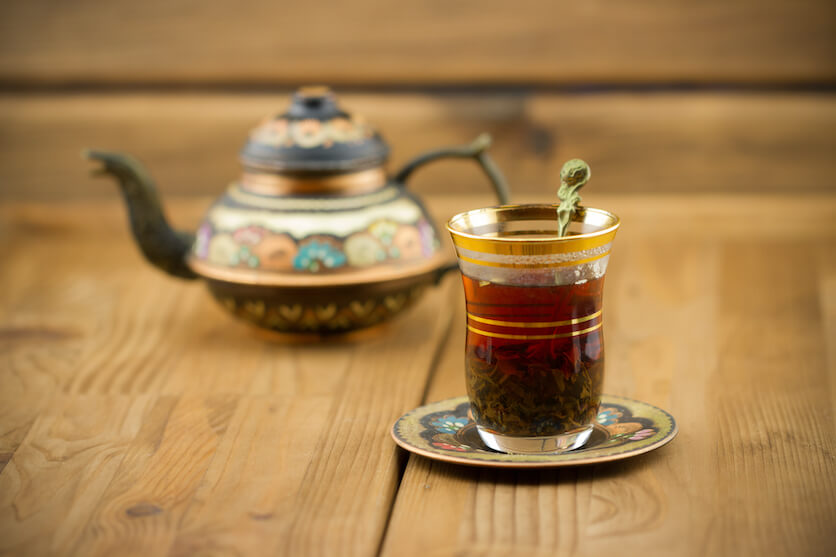
What Does Turkish Tea Taste Like?
You will get various answers as to what Turkish tea tastes like, especially if you ask a Turk or a tourist. The Turks will tell you it’s smooth and bold with hints of sweetness. However, a newcomer (tourist) enjoying this tea for the first time will undoubtedly claim it’s bitter, extremely astringent, and undesirable.
The Turks took this into consideration and created flavored granules for the tourists to add to the tea to make it more palatable. These granules come in apple, lemon, or orange flavors, and when added to Turkish tea, it changes the whole flavor dynamic creating a less astringent, sweet tea.
The tea’s flavor can suffer when left to brew for hours which many cafes in Turkey do. Unfortunately, a stale tea in a cafe may be a tourist’s first experience with Turkish tea giving the impression the tea is highly distasteful.
History Behind Turkish Tea
The tea industry in Turkey is fairly new and did not come to life until around 1917. Cultivation of tea plants began in the Rize province. Laws and regulations for Turkey’s tea industry were implemented in 1924. The country’s first processing plant for tea opened its doors in 1947 and has since prospered and multiplied not only in the Rize province but also in Ordu, Giresun, Trabzon, and Artvin.
Although Turkey may not have the rich and fascinating history behind its tea as China and England do, the tea trade is taken quite seriously here in Turkey.
Tea Region Of Turkey
Turkey’s tea region hugs the southeast edge of the Black Sea in the Kackar mountains. Here the climate is ideal for tea cultivation. The higher elevation with humidity provided by the atmosphere and the Black Sea lends to the unique taste of the tea.
Turkey produces a significant portion (3%) of the world’s tea. According to the Food and Agriculture Organization, Turkey ranks fifth among the highest tea producers throughout the world. Black tea is the predominant tea grown in Turkey.
Tea is among several widely consumed beverages in Turkey. Other beverages include the well-known Turkish coffee, but also sahlep (made from orchid plant roots,) ayran (yogurt-based,) and boza (fermented from grain.)
What Is Special About Turkish Tea?
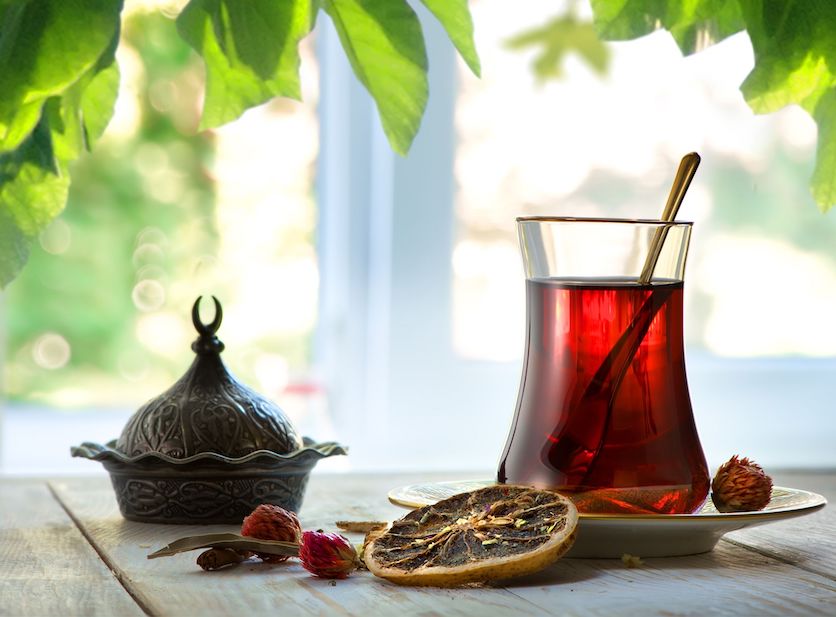
Unlike England, there is no “tea time” in Turkey because tea is served and consumed from sun up to sun down in every situation, environment, and social class. Compared to China, Turkey does not have a tea ritual, although there are unspoken do’s and don’ts when having Turkish tea.
So, what exactly makes Turkish tea so special in Turkey? It’s not the tea itself, but rather the fashion in which it’s enjoyed. In Turkey, the offering of tea is a symbolic gesture of friendship and inclusion. Tea is the epicenter of sharing, good conversation, and social networking.
For many of us, sitting down with a cup of tea is a piece of time carved out for a peaceful few moments of quiet. However, in Turkey, it’s the opposite. When you sit down with a cup of tea, you’ll most likely be surrounded by others conversing with the expectation of your participation. There’s no shyness allowed when it comes to sharing tea in Turkey!
If we were to sum up, what makes Turkish tea so special, it would simply be “Turkish tea is an institution that includes family, friends, sharing, and hospitality.”
Is Turkish Tea High In Caffeine?
Turkish tea is bulked up with caffeine, contrary to what many online sites claim. You’ll find some online blogs and websites claiming Turkish tea is caffeine-free. Black tea, in general, is highly caffeinated. Turkish tea has a concentrated base of black tea.
So, just how much caffeine is in Turkish tea? Well, according to a collaborative study done by chemists entitled “Caffeine Content Investigation in the Turkish Black Teas,” there is a percentage of caffeine in Turkish tea. We have broken down their findings below.
Caffeine Percentage
- Black tea = 4%
- Green tea = 3.13%
If you made a cup of Turkish tea based on the “standard water to tea ratio” (see below) that most of us use, you would end up with a six-ounce cup of tea with a whopping 100 mg of caffeine (6 x 16.70 mg = 100 mg)! The FDA’s recommended daily intake of caffeine is 400 mg or less.
To pin down a precise level of caffeine in Turkish tea is nearly impossible because of the different ways of having your tea prepared* changes the whole caffeine content.
|
Turkish teacup (ince belli) holds 4.25 oz. 4% caffeine = 71 mg (16.70 mg / ounce) |
Water / Tea Ratio
|
*Variables Influencing Caffeine In Turkish Tea
|
Does Turkish Tea Make You Sleepy?
Turkish tea has the opposite effect on drinkers. Rather than sleepiness, the highly concentrated black tea in Turkish tea ramps up the caffeine content, which, when consumed in large quantities, can cause insomnia, excessive energy, jitters, and more. It’s best to say this tea is not ideal for enjoying after 3:00 pm and especially in the evenings. Otherwise, you will be awake for a long time!
Is It Okay To Drink Turkish Tea Every Day?
Because Turkish tea is unadulterated black tea with the occasional addition of beet sugar cubes, the high caffeine content affects the amount of this tea one should consume daily. The FDA’s recommended daily caffeine intake is 400 mg or less.
As we noted above, a Turkish teacup holds 4.25 oz of tea which is about 71 mg of caffeine. Following the FDA’s guidelines, it would be safe to consume 5 cups (4.25 oz servings) per day. So, yes, about 5 cups of Turkish tea consumed daily is considered safe.
What Are The Benefits Of Turkish Tea?
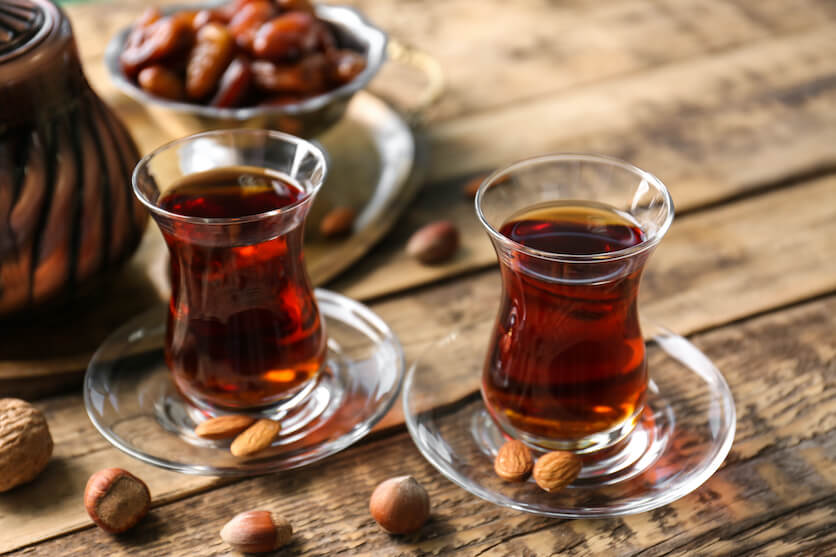
Black tea, in general, provides our bodies numerous health benefits. But when you look at the psychological benefits of tea, the benefits we gain emotionally and mentally are intriguing. Turkish tea is at the core of socializing and the act of hospitality in Turkey. Perhaps we have a lot to learn from their example.
Post-Stress Recovery
The Department of Epidemiology and Public Health, University College London, conducted a study on how tea consumption helped those participating in the study recover and relax after being subjected to stress. Prior to the induced stress, participants consumed black tea for six weeks. Afterward, evidence of less cortisol (stress hormone) was released, and subjects were significantly more relaxed.
Report Of A Collective Collaboration Reduces Depression
Two researchers at the Department of Tea Science, College of Horticulture Science, South China Agricultural University, did a comprehensive study to look at how tea affected depression. Their findings revealed the constituents found in tea worked collectively to reduce the side effects of depression in those who consumed large quantities of tea. Although they claimed more research is warranted, they did report tea to significantly benefit those with depression.
Psychologist Reports Tea Relaxes
Dr. Edward Leigh Gibson, with the University of Roehampton, Department of Psychology and Clinical and Health Psychology Research Centre, published a handbook entitled “Psychological and Physiological Consequences of Drinking Tea.” Through his research, he claims that tea has a subtle effect on our brain and suggests that tea consumption promotes relaxation and sustained attention through the interaction of theanine and caffeine.
How To Make Turkish Tea
Because Turkish tea is prepared and enjoyed in one manner only, we have provided a simple way to enjoy this tea in your home. So, how long do you steep Turkish tea or brew it without the double teapot? You can use a kettle to warm the water and a teapot to steep and hold the tea.
Turkish Tea Recipe
Learning how to brew Turkish tea isn’t complex at all. All you need is a teapot and a kettle. Since Turkish Tea is served in social settings, we hope that you make this recipe and prepare this tea for your family or guests.
Ingredients
- 16 ounces of water
- 12 tsp. of loose leaf black tea (Ceylon)
- 2 beet sugar cubes per person
Teaware
- Turkish teacups with saucers
- Small teaspoons
Directions
- Fill the kettle with water.
- Bring the water to a boil.
- Pour 2 cups of water into the teapot.
- Place loose leaf tea into an infuser and drop it into the teapot.
- Allow the tea to steep for 10 minutes.
- Remove the infuser from the teapot.
- Fill each teacup with tea ¼ of the way.
- Pour hot water into teacup 1″ from the rim.
- Place two sugar cubes (beet sugar if you can find it) on the saucer next to the teacup.
- Hand the teacup/saucer to each person along with a small spoon.
Tip: Turkish tea pairs perfectly with a simple, subtle sweet confection such as shortbread or baklava.
Do You Put Milk in Turkish Tea?
Turkish tea never has milk or cream added to it. It is intended to be enjoyed without any condiments (except the beet sugar cubes.)
“Afiyet Olsun” (Enjoy!)
Turkish tea may not be a complex tea or have the historical background other teas may have, but this tea holds great value because of how it’s enjoyed. The Turkish culture embraces tea as a vessel to connect people while fostering fellowship and kinship.
